FOBMC #2: "From Under the Cork Tree"
An album for teens, about a teen, written by Pete Wentz. Ugh.
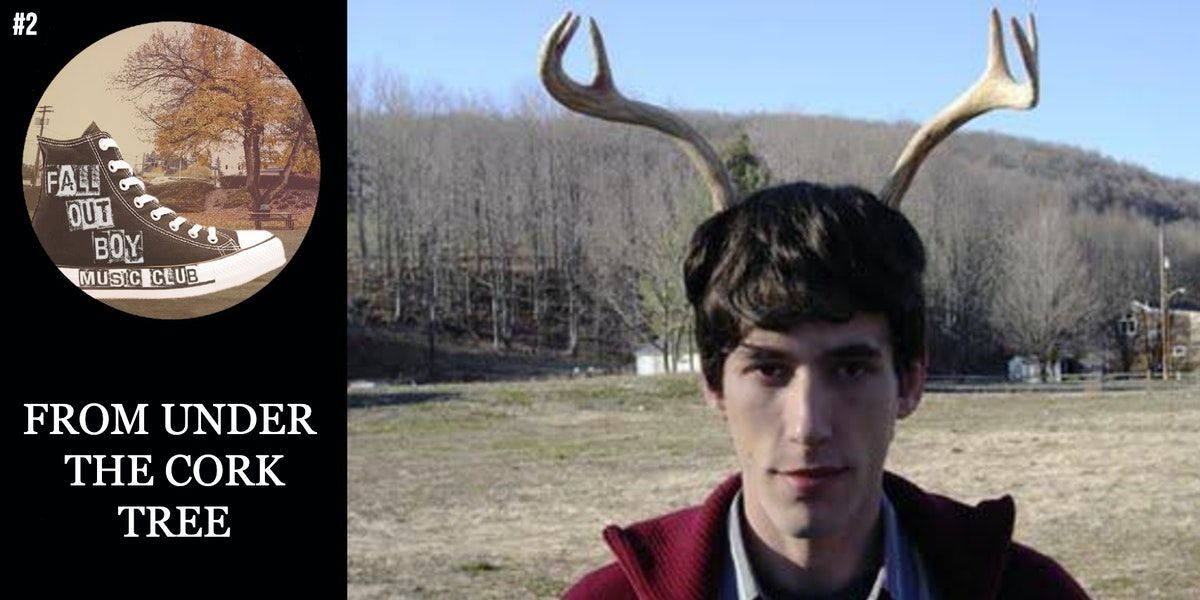
Welcome back to the Fall Out Boy Music Club! It’s the official fall of Fall Out Boy here at Friendmendations — every other week, we’ll analyze the discography of Chicago’s angstiest export. Share the link on social media! Get all your former emo friends to join the club!
Last time we looked at the origins of the band (and then took a fun detour to discuss the arrival of their teenage protégés, Panic! at the Disco.) This week, Fall Out Boy achieves mainstream success… with an album about a high schooler.
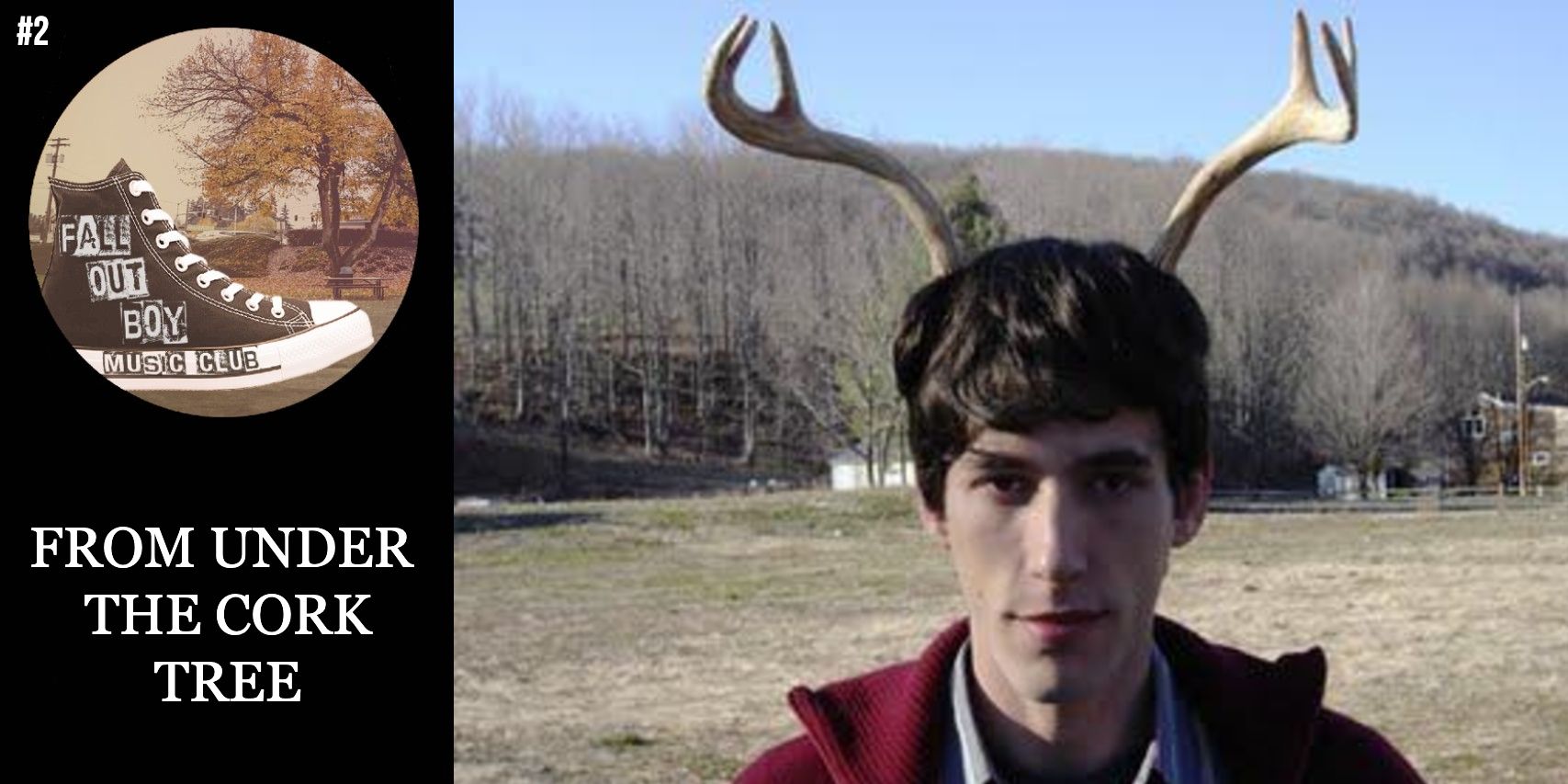
In 2019, around the time she was crowned Billboard’s Artist of the 2010s, Taylor Swift gushed, “I love Fall Out Boy so much. Their songwriting really influenced me, lyrically, maybe more than anyone else. They take a phrase and they twist it. ‘Loaded God complex / Cock it and pull it?’ When I heard that, I was like, ‘I’m dreaming.’”
While I can’t help but wonder if she misremembered the specific lyric that so excited her — “I’m just a notch in your bedpost, but you’re just a line in a song” sounds more Swiftian to me — I don’t doubt her fandom. She’s gone on the record multiple times as an admirer of Pete Wentz. “If I had to pick a favorite lyricist, it would be a tie between him and Lana Del Rey,” she said in another interview. “‘Blank Space’ is a song that’s just zingers, one after another after another, which I definitely learned from listening to Fall Out Boy.”
The comparison might seem odd at first, but you can see parallels in both writers’ work besides zingers like “rose garden filled with thorns.” You can see the Wentz influence in the way that she crams different evocative images together into phrases and a Fall Out Boy sensibility in the way her melodies have to bend to accommodate the lyrics. Like Pete, Taylor also relies on a few key images over and over (hers are fairytales, eyes, and cars; his include lips, hips, hearts, and gold) and both have returned to high school characters in their songs for years after they aged out of it.
So how the fuck did a group of hardcore hooligans from Chicago end up influencing a chart-topping pop star who once played country music?
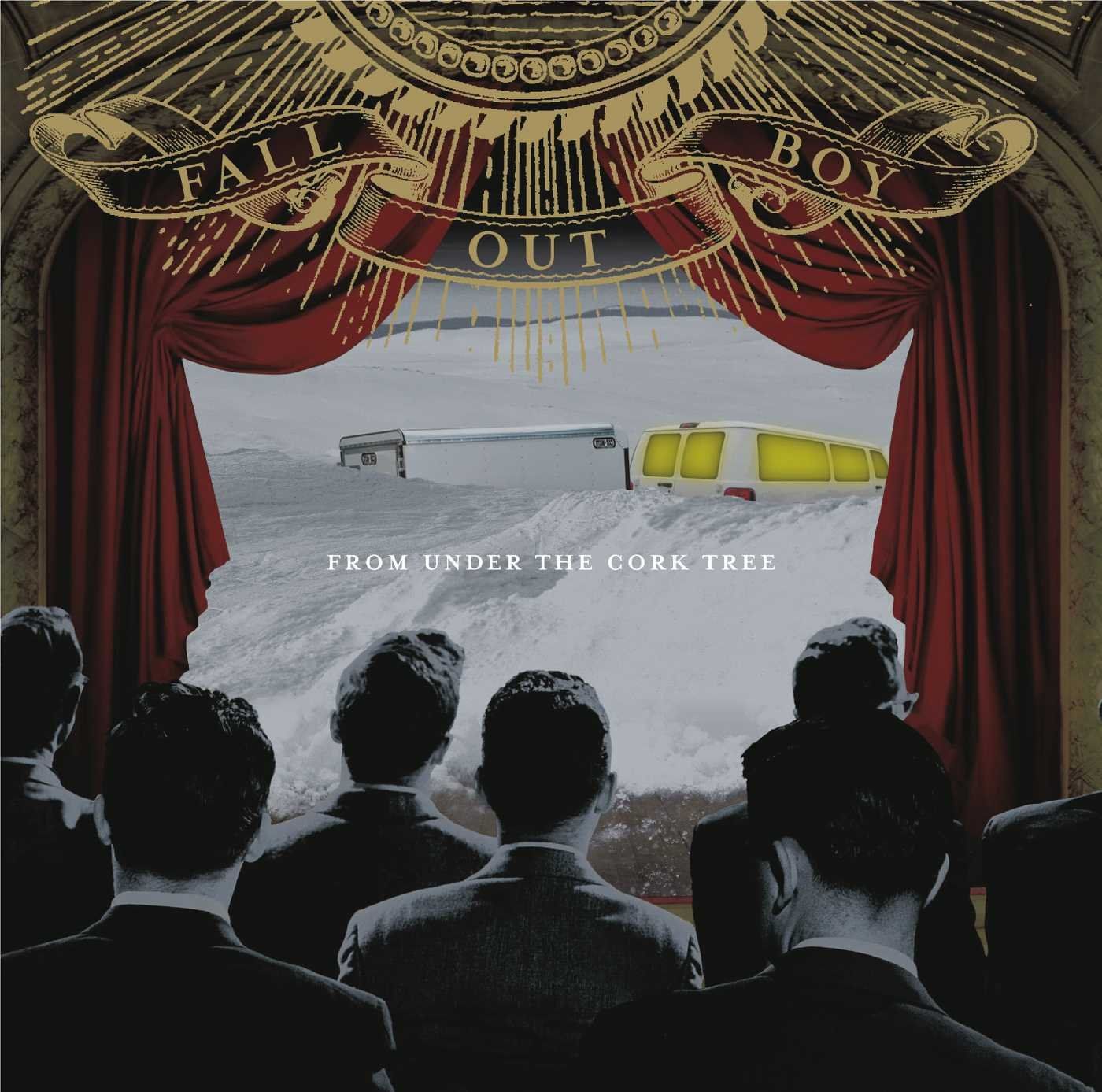
Fall Out Boy didn’t invent emo, a genre that began as “emotional hardcore” in the 1980s. Nor did they come up with the idea to combine emotional hardcore with pop-punk — bands like Jimmy Eat World and Brand New did so before them. But Fall Out Boy was the first emo band to embrace social media and gain superstardom in the internet age. MySpace launched in late 2003, and Fall Out Boy was sharing music videos from their album Take This to Your Grave with MySpace friends within a year. Teens took notice.
Take This to Your Grave had seen incredible success for an indie record, selling over 200,000 copies. But Pete Wentz was ready to be a real rock star. He was the one spearheading the band’s social media presence, posting pictures on MySpace, blogging honestly about mental health, and answering fans on the band’s website when they asked for advice. He’s front and center in all of Fall Out Boy’s music videos, slamming on his bass as if it were a guitar. In one video, he lip-syncs backup vocals that were clearly recorded by singer Patrick Stump as if they were his own. Patrick was awkward and self-conscious, and he didn’t mind Pete taking over as frontman. “Pete loves photo shoots, and I fucking hate them,” he explained gratefully at the time.
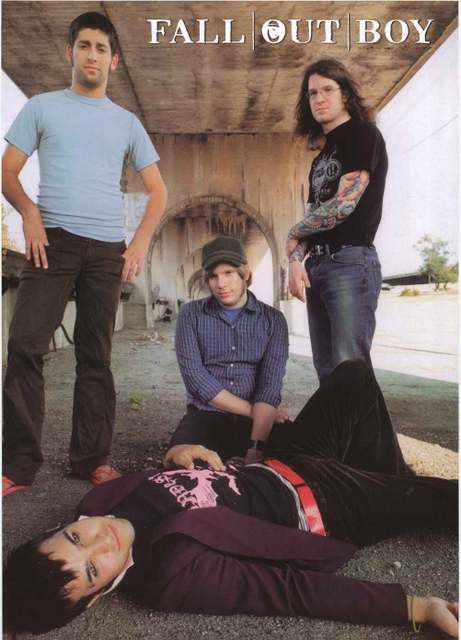
Patrick was shy in public, but he was vitally important to the band. Guitarist Joe Trohman described him as “some kind of genius — he’s a total mad scientist,” responsible for coming up with all musical ideas after receiving Pete’s lyrics. Pete wasn’t easy to work with, and Patrick notoriously punched him during a dispute while recording their second album. Producer Neal Avron, who would work with Fall Out Boy for three records in a row, recalled:
“There was always tension on every record at some point. Typically, that would come in the form of Pete writing the lyrics and Patrick editing and putting them together. If Patrick sang it with Pete’s general approval of, ‘Yeah, I’m down with these lyrics,’ then after we worked really hard doing all the performances and getting it just right, Pete would come in and go, ‘You know, I wanna change this line and this line and this line…’ and Patrick would really blow a gasket, because he’d worked so hard on the performance, and the harmonies. His harmonies are very intricate and take a lot of time to develop, so he wasn’t happy re-doing stuff like that. Pete was more of a big picture guy. He didn’t wanna be in the studio for 12 hours a day. He wanted to come in with fresh ears.”
The central contradiction of Fall Out Boy is that they wouldn’t exist without Pete Wentz, but also Pete Wentz sucks unbelievably badly. It’s indescribable how much that dude sucks. If you’ve heard of Fall Out Boy, it’s because of Pete, but if you hate them, it’s also probably his fault. I’ve often contemplated the phrase “greater than the sum of its parts” in relation to Fall Out Boy, a descriptor that ends up confounding me in this case. Patrick Stump is certainly a musical prodigy, with a vast knowledge of references and an uncanny ear for melody, and Joe Trohman and Andy Hurley are both talented, technically proficient, well-respected musicians. Pete Wentz is a mediocre bassist, often-embarrassing lyricist, and all-around nightmare of a de facto frontman. How do you calculate the sum of the parts when one part is in the negative digits?
With their 2005 album From Under the Cork Tree, Fall Out Boy reached the level of fame that Pete had been craving. This is both because of him — he was constantly grinding, behind the scenes and front and center in public, to get them more attention and success — and in spite of him. Cork Tree is the quintessential Fall Out Boy album in how clearly it reveals the tension in the songwriting push-and-pull between Pete and Patrick.
On Take This to Your Grave, the two had labored line by line, fighting over lyrics but working together to make them right. Some lines or verses were written by Patrick as he was composing, with Pete offering suggestions. On Cork Tree, Pete took over all lyrical duties, sending long emails of ideas for the “mad scientist” to turn into actual songs. Knowing this, it’s easy to see where fragments of ideas were crammed together in ways that only sort of fit. “Tonight, it’s ‘it can’t get much worse’ / versus ‘No one should ever feel like...’” is one great example, a line ending on a fully unfinished idea, and the seams are especially noticeable when you hear how Patrick clips “versus” to “verse” while actually singing the line. (It’s the same way he’ll cut out “the” in the line “why don’t you show me [the] little bit of spine” later in the song.)
Weird wrinkles like that are over the record. On “7 Minutes in Heaven (Atavan Halen),” the lyrics set up a self-deprecating punchline on paper: “I keep telling myself, I keep telling myself / I’m not the desperate type / But you’ve got me looking in through blinds.” In practice, though, the joke is completely lost, with “looking in through blinds” cut off by the next line of the chorus to make a more pleasing melody. I suspect that the more Frankensteined songs on Cork Tree came from sessions where Pete was absent; at one point during the recording process, he overdosed on Ativan in a suicide attempt and “withdrew from the rest of the band, only appearing to hand them his lyrics,” according to a profile a year later. (“Atavan Halen,” with its song title clearly referencing the incident, was clearly written in this period.)
Even when the lyrics fit the melody, they were often pretty bad. Pete had expanded his scope beyond Grave’s bitter breakup songs and odes to friendship. Now he was making grandiose statements about the band’s importance (“We’re the therapists pumping through your speakers, delivering just what you need”) and his own (“If you wanna go down in history, then I’m your prince.”) Attempts at wordplay often don’t work (“It’s mind over you don’t matter!”) One song gets a spoken-word outro by Pete that was so mortifying that he himself had to hide in a bathroom to record it but still did not think to spare the world from having to hear it.
But the solid songs are emo bangers for the ages. “Sugar, We’re Goin’ Down” was huge for a reason, and it wasn’t the lyrics (which no one could interpret anyway; Patrick decided to try a punk, slurry approach in the recording booth that made them even more incomprehensible than they were on paper.) Drummer Andy Hurley remembered Patrick leaving the recording booth after laying down his “Sugar” vocals and joking, “I just got your kid’s college tuition paid for.”
My favorite song on the album (and probably my favorite Fall Out Boy song ever) is “A Little Less Sixteen Candles, A Little More ‘Touch Me.’” It was so catchy that I bought it on iTunes for 99¢ to load onto my iPod Mini so I could listen to it school in the three days before the weekend, because I simply couldn’t wait for my mom to drive me to Best Buy to get the CD. The song still activates every pleasure center in my brain, and I’d like to break it down because it is PEAK Fall Out Boy.
The title is terrible, obviously. It was originally called “A Little Less Molly Ringwald, A Little More Samantha Fox,” but for some reason they decided to make it worse, which is very on-brand. The music video is so embarrassing that Pete’s mush-mouthed line delivery of “You call yourselves hunters?!” remains an inside joke in my family 15 years later. (“Yacall yourself hunners?”)
Oh, how very Fall Out Boy it all is! Too earnest to be funny, too dorky to be cool. Pete is obviously the star, performing martial arts and heroically battling gangs of bloodsuckers, while Patrick ends up eaten by vampires. Emo artists from Pete’s newly-formed Decaydance Records all show up for cameos and flip-phone product placement abounds. The concept barely works for the song, but lines like “why don’t you just drop dead?” and “kiss her, kiss her!” are grafted onto a storyline about vampire slaying in painful attempts to justify the theme. Most bizarrely, the appropriate concept for the video was used on a completely different song. I’m positive that director Alan Ferguson pitched them the treatment for an 80s high school dance for this song, the one that references 16 Candles in the title and talks about the girl that the boys want to dance with, but for no clear reason the band chose to apply that theme to “Dance, Dance” instead.
And yet, and yet! I love this song! The lyrics are precisely in Pete’s wheelhouse, lovelorn bitterness from the perspective of a teenage underdog. “You said you’d keep me honest / but I won’t call you on it” might be his best couplet ever. Patrick’s memorable melody accommodates the lyrics with no clumsiness and his ever-improving voice delivers a perfect bridge. You can see why Ferguson snuck a choreographed dance in the video there — this pop-punk song has a soaring interlude that could have come from musical theatre.
It bears mentioning, though, that Pete wasn’t a teen when he wrote this song. He was 25, five years older than his bandmates Patrick and Joe and eight years older than his underage girlfriend, a girl he said he was “obsessed with” and wrote most of Cork Tree about. Despite referring to himself and his band as “kids” on four of the album’s songs (and one bonus track on the deluxe edition), he was a grown man with significant power.
Pete’s ex is now a married woman with a career of her own. In a recent podcast interview about her business, she references earlier trauma without mentioning him by name, though documentation from the time that they were dating confirms that she’s talking about Pete. “When I was quite young, I started dating a guy who was a lot older than me,” she said. “Looking back on it, in retrospect in 2020, everything was really fucked up about it and really unhealthy. And I was young and impressionable and easily manipulated — and he was very good at that. When I was 15, I entered into this four-and-half-year relationship with — he was 23 at the time and it went until he was 28 or so.”
She described their relationship as “me seeking out approval… I put everything into him. He represented everything that I wanted to be and could be, and he had all the power. And it continued into this crazy, crazy, emotional warfare of a relationship for four years.” When it ended, she said, “After that relationship, I felt so broken.”
In 2005, when Cork Tree was released, Pete was arrested after an argument with what journalists called “his cheating girlfriend.” He got into his car, tore off, and immediately hit into two other vehicles “like bumper cars,” in his words, then got out of the car and began punching its windows and mirrors in rage: “I punched the side mirror off a car, and an officer grabbed me. I made an attempt to punch him as well. It was pretty pathetic. He handcuffed me and put me in the back of a car... The neighbors were outside and the girl was crying. I had to call my manager from jail.” His girlfriend would have been a high school senior at the time.
It wasn’t entirely clear which songs on Grave were written about this relationship, if any, but that’s not the case with Cork Tree. Lyrics like “Turn off the lights, and turn off the shyness / cuz all of our moves make up for the silence” and “I’ll weigh you down, I’ll watch you choke / you look so good in blue” were definitely written about a high school girl by a grown man who was rapidly acquiring more fame and power. How are you supposed to feel about that?!
Less bro-y than blink-182 and not as goth like My Chemical Romance, From Under the Cork Tree was an album that was perfect for emo kids. It was made for teens who would appreciate the album’s wrist-slitting jokes (“The ribbon on my wrist says ‘do not open before Christmas’”) and dramatic spoken-word angst, but its singles were fun enough to appeal to a musical theatre kid like me or a country star like Taylor Swift.
It has some truly classic 00s pop-rock songs. They were written by a predatory egomaniac with mental health issues and an endless supply of stupid fucking ideas like “the bartskull” (a bat/heart/skull insignia that he plastered on music video props, clothing, and his own body) and the “lick lick salute.”
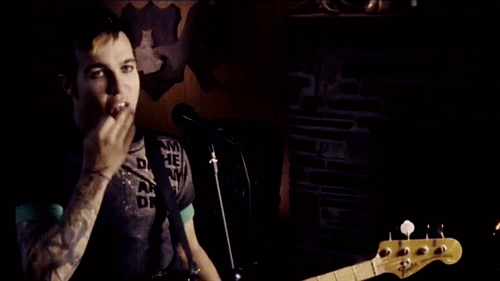
I’m fine leaving it as a relic of history.
Next time in the Fall Out Boy Music Club, we’ll look at Infinity on High, the point at which Fall Out Boy collaborates with Jay-Z and Pete Wentz starts a goddamn arms race to become the emo Hova.
The Fall Out Boy Music Club logo was designed by Chuck Kaslow. Please tell your friends to join the club!
